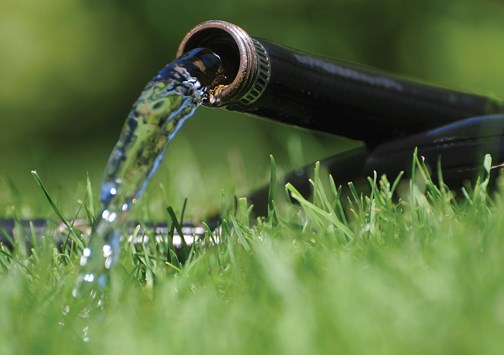North Shore homeowners may watch their lawns get a little browner this summer, following a recent adjustment to Metro Vancouver’s water shortage response plan.
Metro Vancouver recently amended the plan to avoid the drought conditions that led to Stage 3 water restrictions during last year’s parched summer.
Limits to lawn sprinkling will go into effect two weeks earlier and extend an additional two weeks. Restrictions will start on May 15, previously June 1, and end on Oct. 15, previously Sept. 30.
Another major change to the plan allows pressure washing for esthetic purposes under Stage 2 restrictions. Businesses like car washes were able to survive the Stage 2 restrictions because they recycle the water they use, said Darrell Mussatto, chairman of the Metro Vancouver’s utilities committee and mayor of the City of North Vancouver. Previous to the change, pressure washing could only be done for health or safety, or to prep an area for painting.
“The reason was we really didn’t want to put people out of business. It was one area that stood out as having the greatest impact, that had a chance of really effecting business or putting them out of business,” said Mussatto.
To further address the problems faced in 2015, Metro Vancouver staff are also looking into water metering.
White Rock and West Vancouver both use the system to monitor their water consumption and the meters have proven successful in curbing how much is used in those municipalities. But the costly solution isn’t the best fit for every area of the region, said Mussatto, who believes that influencing behaviour is a better angle to approach the issue from.
“The study is going to look at what’s the best way to influence people’s consumption at the least cost. You don’t want to end up having to pay a whole lot of money when you can pay less to change behaviour,” said Mussatto.
Offering incentives for low-flush toilets, efficient sprinkler heads, and stepping up enforcement are ways that Mussatto hopes the region can promote water conservation without resorting to the expensive alternative of water meters.
“You have to put the system in and it can cost anywhere from $400 to $1,400 a house, and it costs between $40 and $60 per year to measure and to bill. Is that the best use for our funds? That is part of the big study we’re doing over the next couple of years,” he said.
Promoting mindful consumption is another tactic Metro is utilizing with their Water Wagon that travels to public and community events during the region’s dry season.
“We’ll set it up and we have a team that goes along with that. They answer questions and promote the good drinking water that we have in Metro Vancouver and how we need to be mindful about how we use it,” said Marilyn Towill, Metro Vancouver’s division manager of water services.
Their team will be promoting water-wise ways to clean up driveways and wash vehicles as well as how to make the most out of household appliances that use water.
“I think overall, people are just more aware of how much water they’re using and so they’ll be more aware of the water restrictions. We’re quite hopeful that people will continue to decrease their water consumption for this year,” said Mussatto.
With better conditions on the mountains, the more substantial snowpack will help with reservoir levels in the coming seasons. The wet weather in the Lower Mainland means good conditions on the ski hills, said Towill, who reported that their last survey done at the end of February on the mountains reported a 90-per-cent average snowpack for the year.
“We are in much better shape than we were last year at this time,” she said. “It doesn’t tell the whole story in terms of what’s going to happen in the summertime, but certainly it puts us in a better position in terms of being able to have reliance on that snow melt to provide part of our summer water storage.”



